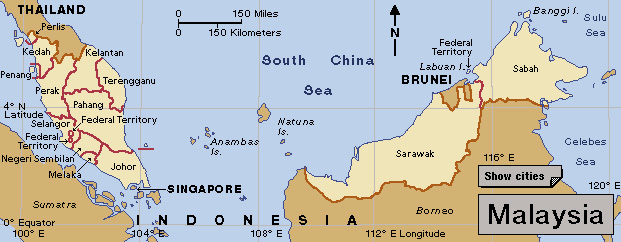Johor (pop. 3,348,283) is the most southern state of Peninsular Malaysia. A short causeway across the Straits of Johor links Johor with Singapore. The state capital is Johor Bahru. The head of state of Johor is a sultan, who is a hereditary ruler.

Just over half of Johor’s population are Malays. About one-third are Chinese and 7 percent are Indians.
Johor is a major producer of rubber and pineapples. It also produces palm oil, a vegetable oil made from palm tree nuts. Johor’s huge forest reserves are the basis of an important timber and wood-processing industry.
During the 1980’s, there was major expansion of industrial estates and township projects across the state, and the emergence of an important financial services sector. A number of international companies moved to Johor from Singapore. Many people living in Johor commute to work in Singapore.
Most of Johor is low lying, with gently sloping hills. The highest point is Mount Ledang (Ophir), which reaches 4,186 feet (1,276 meters) close to the border with Melaka. Many short rivers flow out of the central, hilly part of the state, and drain into either the South China Sea, the Strait of Malacca, or the Straits of Johor. The coastal districts, particularly on the east coast, have extensive swamp areas.
The area of Johor was probably the site of important trading settlements as early as A.D. 800. During the 1300’s, it was a dependency of the Javanese empire of Majapahit. In the 1400’s, the area came under the authority of Melaka. Following the fall of Melaka to the Portuguese in 1511, Johor became an important center of trade and emerged as a major political power.
Both the Portuguese and the north Sumatra sultanate of Aceh launched raids against Johor in the 1500’s. In the early 1600’s, Johor made an alliance with the Dutch and was able to free itself from the Portuguese and Acehnese threats. Forces from Johor supported the Dutch during the siege of the Portuguese settlement of Melaka in 1640 and 1641. Through the 1800’s, the temenggongs (chief ministers) provided a line of capable rulers in Johor. The most notable was Temenggong Abu Bakar, who assumed the title of sultan in 1885. He used his close relationship with the British in Singapore to modernize his administration and to develop the economy of Johor. The Johor sultanate retained much of its independence under British protection. Commercial agriculture grew rapidly.
In early 1942, Japanese forces defeated the British, but the prewar administration returned in 1945. In 1948, Johor joined the Federation of Malaya. Malaya became independent in 1957.
